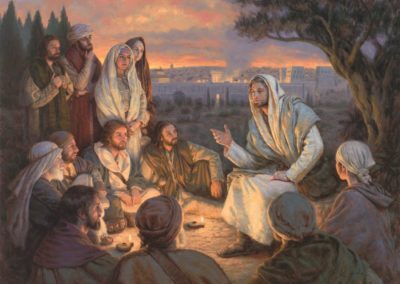Stories of How I Know
“Happiness in family life is most likely to be achieved when founded upon the teachings of the Lord Jesus Christ. … We call upon responsible citizens and officers of government everywhere to promote those measures designed to maintain and strengthen the family as the fundamental unit of society.”
—Paragraph 7, sentence 4, paragraph 9, The Family: A Proclamation to the World
STORIES OF HOW I KNOW

Objective
Understand your own beliefs and experiences better by writing about them. By coming to understand our experiences through the lens of faith, we can better support the prophetic teachings in the Family Proclamation.
Happiness in family life is most likely to be achieved when founded upon the teachings of the Lord Jesus Christ. … We call upon responsible citizens … everywhere to promote those measures designed to maintain and strengthen the family as the fundamental unit of society.
Materials Needed
Please note that this lesson can take from anywhere from 20 to 45 minutes based on how many story prompts participants choose to write about. Please provide participants with:
- a pen or pencil for each participant (or crayons for smaller children)
- lined paper to write on (or blank paper for small children to draw pictures on)
- a timer
- if possible, a friend or family member to go through this process with.
Introduction
Read the following section aloud: A testimony is a person’s statement of experiences they’ve had that show how they know things. For example, when witnesses testify in a court of law, they recount things that happened to them. When people testify in church settings, they recount events or spiritual experiences that led them to know and understand God better.
Sometimes people feel hesitant to share their testimony with others because if they haven’t had remarkable, spectacular spiritual experiences, they think they don’t have a testimony.
But in reality, any time you live a true and good principle and experience the good outcomes of doing so, then it’s a principle you have learned for yourself. Sharing that experience with another person is testifying.
Because you have lived many gospel principles throughout your life, you already have a testimony of some things. For example, you may have already seen the effects of living principles like honesty, kindness, obeying the Word of Wisdom, using clean language, turning off an inappropriate song or movie, repenting, worshipping at Church, serving others, paying tithing, and many more. But it often takes some thought and reflection to realize what you’ve learned. The story-writing process can help you find words for declaring the truth about what you know. It doesn’t need to be the truth of all things, just your things; the truth that you have learned so far.
Read the following section aloud: This lesson can help you with that, along with a few other things:
- As much as we learn through science and reason about the proclamation, there are still many things we can only know through faith and revelation. So examining our faith and testimony of Jesus Christ’s teachings is important.
- This lesson will help you learn the important skill of thinking about, and writing your personal stories. Being a good storyteller helps us with self-discovery, gives us a way to have meaningful connections with others, and can even help us heal from difficult times. We can persuasively promote and strengthen the family in society by telling our stories clearly and compellingly.
Jesus Christ is an example of being a good storyteller. He taught using parables, which are earthly stories with heavenly meanings. He told stories about everyday things like fishing, farming, home life, and nature. We can do the same when we tell stories from our own everyday experiences.
Image credits: Five of Them Were Wise by Walter Rane, The Sower by Johne Richardson, Christ Teaching His Disciples by Justin Kunz
Main Activity
Read Aloud: We will be doing a 10-minute story workshop to help you write about your own personal journey, or story. Choose one prompt question from any category below that you want to write about.
Prompt Questions
1. Do you pray? How often? Explain why or why not?
2. When you pray, describe who you picture listening to you. A loving father who knows you, loves you and wants what is best for you? A stern authority disappointed in your weaknesses and mistakes?
3. Do you pray with a desire and expectation of receiving answers? How do you receive those answers? Do you usually act on those answers, in what ways?
1. Do you read scripture? How often? Explain why or why not?
2. What do you consider the word of God? Where do you search for it? In what ways do you study it, explain your process?
3. Are there scripture verses that have answered questions, worries, or given you comfort? Describe a time this happened.
4. Have you ever felt answers, comfort and/or direction that came from listening to a prophet or apostle? Describe the experience.
1. Do you serve others? How often? Explain why or why not?
2. Are there others you think might need your help? In what ways do you try to help them? How does helping others affect your mood, and/or how you feel about yourself/them?
3. In what ways do you try to be like Christ?
4. Do you gather with others who are trying to be Christ-like? If so, how often, where? In what ways do you serve these individuals? What ways do they serve you?
Read Aloud: Now that you have chosen a prompt question to answer, follow the steps to write your story below. For your first time through this lesson, it’s best to use a timer to make sure you don’t take too long on each step. This will help you move through the process quickly so you don’t get stuck on any one step. You can always go back later and add to or refine your writing. Let’s begin!
Story Writing Steps
1. Talk. (2 minutes) Talk through your answer to the question or if you are going through the process on your own, quietly think through your answer. Focus only on your answer for the full two minutes.
2. List. (2 minutes) Make a simple bullet list of what you just talked/thought about. Just write down single words or simple phrases to help you remember important parts of what you said or thought.
3. Expand. (3 minutes) Now write out the most important bullet points with 2-3 full, descriptive sentences. Think about using at least two of your senses as you describe your answer. (ie, What was the temperature in the room, or where you were? What could you see, smell, hear?)
4. Polish. (3 minutes) Is it a story? Take these three minutes to consider if your story needs a few more elements to be complete? Consider, have you described (a) the place/setting, (b) individuals involved, (c) a problem, (d) how the problem was solved, and (e) what you or someone else learned as a result?
Read Aloud: Congratulations! In only ten minutes, you have created a draft of the first part of your faith story. Did you know that what you just wrote is your testimony? You told about your experience with living a gospel principle and the resulting blessings you saw or felt. You can continue writing about your testimony of so many other topics besides the ones listed here! For now, though you may repeat this process for the other two categories. You can always go back and answer more of the prompts or add more description and elements to your story.
Assess
Read Aloud: With your story developed, consider sharing it in some way with others. As you share your story, you invite others to also share theirs. You will learn nuances of your story you may not have recognized, and will learn from others’ experiences as well.
Choose a way to share your story or stories with others. You might:
- read it to others
- send it as a text/email or letter
- create or combine it with music
- capture photos or memorabilia to illustrate your story
- create a video
- print it in a photo book
- write it in a new journal
- draw sketches
- create a watercolor
- consider a story performance or play
- make it into a set of memes
- post on social media about it

Read Aloud: Elder Gene R. Cook explains why being able to explain your stories to others is important:
One reason why personal experiences are so effective is that they have touched our hearts—and when we speak of things that we feel deeply, it is more likely that we’ll be able to touch the hearts of others. If you read a lesson and tell a story in someone else’s words, it won’t have the same impact. … It is easier for us to apply a truth if we can see it in action in someone else’s life. And it is easier to commit to live a truth if we can feel the Spirit through those experiences of other people.”
Gene. R. Cook, Teaching by the Spirit (2000), 64, 122–23.
Reflect
Read Aloud: Can you think of someone else that might enjoy the process of writing about their faith journey: a friend or family member, a missionary or teacher? Consider inviting them to do this lesson, and maybe even offer to go through it with them.
Testify
Read Aloud: Nephi wrote, “Upon these I write the things of my soul” (2 Nephi 4:15). Your stories are the things of your soul. Which ones will you tell next? Dallin H. Oaks said, “A testimony of the gospel is not a travelogue, a health log, or an expression of love for family members. It is not a sermon” (Testimony, General Conference, April 2008).
When you testify simply by recounting how you know what you know, you provide a unique way for truth to reach others’ hearts, in a way that perhaps no one else’s experiences could.
Share your a time in your life when hearing someone else’s story or testimony helped you.









